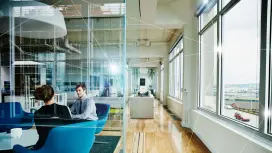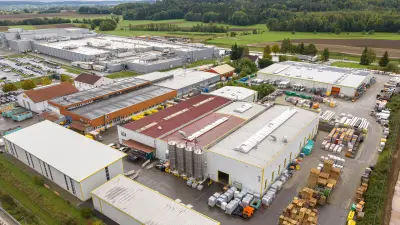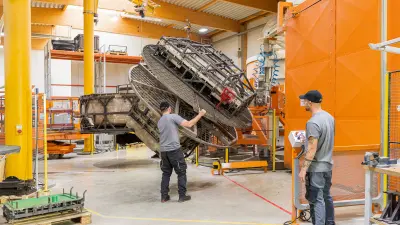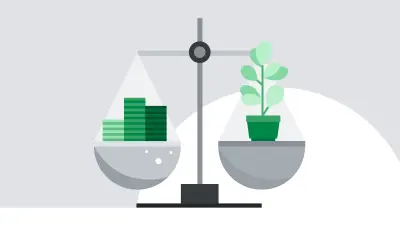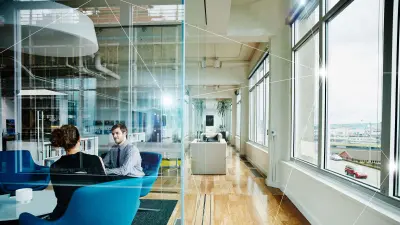“My advice to other entrepreneurs: give priority to this topic!”

One step at a time: with support from Bosch Climate Solutions, the tradition-steeped family-owned company of CEMO has embarked on the path of producing sustainably and offsetting excessive emissions. In this interview, shareholder Margarete Gödel describes the challenges involved and why she would take this step over and over again.
Ms. Gödel, you’ve worked with Bosch Climate Solutions to prepare a sustainability report for CEMO. What motivated you to do this?
Margarete Gödel: Well, it wasn’t just to comply with the legal requirements. Sustainability has always played a role in our company. My father founded it back in 1960, developing containers that were so durable that they could be used for generations. Even after 60 years, they’re still free of leaks and can be repaired. But they’re made of fiberglass-reinforced plastic, which unfortunately can’t be recycled. This is a major disadvantage. So as far back as 30 years ago, we started developing products they didn’t depend on this material. They meanwhile account for the lion’s share of our sales. So for us it makes perfect sense for us to look at our processes and develop a climate-compatible strategy.
And you asked Bosch Climate Solutions for advice on this.
Margarete Gödel: We checked out several consulting firms and decided to go with Bosch Climate Solutions. What convinced us, apart from its expertise, was its young, highly motivated and committed interdisciplinary team. And for this project, it was essential for us to move past all of our preconceptions and blaze new trails. What greatly helped me in making a choice: I asked for references and talked with them about their experiences.
You had already taken steps to produce more sustainably. So why is a sustainability report now also required?
Margarete Gödel: To be honest, it wasn’t until we started working with Bosch Climate Solutions that we realized that we had already done things in the past that we could rightfully be proud of. And that we really could have talked more about them. Responsibility has always been an important theme for our directors and family members. Many of my nieces and nephews have studied sustainability-related topics at college, or else it's a core aspect of their work. So maybe we had just always done what we did as a matter of course. While working on our climate strategy, we realized how important it is to make what you do visible to others on the outside. Along the lines of do something good and talk about it.
How did the idea of defining a climate and sustainability strategy arise?
Margarete Gödel: The idea came from our directors, which I already mentioned – they have expectations of CEMO. I myself play a dual role, since I’m both a director and actively involved in our operations. Everyone was motivated, and initially each of us researched on their own. But pretty soon we all realized that we could only achieve it as a team. After all, we didn’t have our own in-house sustainability officer.
What did you struggle with?
Margarete Gödel: The obvious challenge is familiarizing yourself with the requirements and all the terminology, abbreviations and acronyms that are used. A lot of it is in English. How is it all connected, and how do you create a sustainability report in line with the Global Reporting Initiative? At the start we weren’t even sure what the GRI actually was.
How important was it for you to take on this task?
Margarete Gödel: Very. I think that it’s key for a member of our management to take responsibility for this topic. Top management has to support it, that’s what makes the difference. This is the only way to really get the theme of climate neutrality* onto our agenda. At the end of the day, it’s also about managing capacities and money.
What were your first steps?
Margarete Gödel: Well, you ask yourself which regulations are relevant. How much effort will it involve, and how big are the required investments? How much money can we save over the long term? At the same time, you wonder how decisions will impact the company itself, and also partners and supply chains. Although at that point we still only had a vague idea of how we wanted to systematically proceed, in 2022 we integrated the theme of climate neutrality* in our strategy. With a timeline, budget, and specific targets.
So you had a goal but the path for achieving it was still fuzzy?
Margarete Gödel: Exactly. Soon afterward we launched the project with Bosch Climate Solutions. We worked together to develop a concept, strategy, and roadmap and identify the essential topics for preparing carbon balance sheets for the various scopes. Scopes 1 and 2 deal with a company’s own carbon emissions and possibilities for reducing them, while scope 3 is about emissions from the upstream and downstream supply chain. Achieving climate neutrality* is a process.
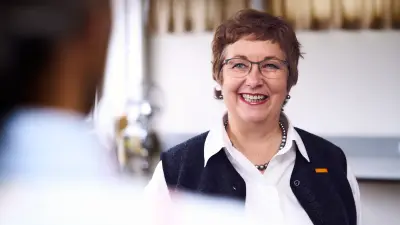
How long will it all take, and what would you recommend to other companies?
Margarete Gödel: After the kickoff, it took us five months to develop a plan. My advice for other companies is to give this topic high priority. And make sure that the employees involved in the project have enough capacity to devote to it. I personally set aside about forty percent of my working time for it. To make that possible, we had to reassign some of my tasks in-house.
How did the collaboration with Bosch Climate Solutions work?
Margarete Gödel: We developed a holistic climate strategy across all three scopes. As a result, our sustainability report is based on real figures and has a lot of substance. It gives us a tangible basis for moving forward and implementing things. That’s now up to us.
How did the collaboration go in practice?
Margarete Gödel: We took a hybrid approach to cooperation. There was a fixed weekly virtual meeting, and beyond that we quickly and unbureaucratically resolved any pressing issues over the phone. Bosch Climate Solutions came to us in Weinstadt for milestone or kickoff presentations. I thought that was a good idea, because it let their team quickly and intensively get to know us, our history, and our values. And it helped us understand better how the different scope levels build on one another. It was eye-to-eye collaboration.
How much effort did it take to provide the required data?
Margarete Gödel: Companies actually already have all of the data they need for scope 1 and 2, it just needs to be collected. The profiles and tables that Bosch Climate Solutions gave us were clearly structured and we just had to fill them in. So the amount of work that each of us had to do was manageable. This also made it easy to involve our subsidiaries in France and northern Germany. Scope 3 is a bigger challenge.
How so?
Margarete Gödel: Everyone has to pitch in to achieve scope 3. A lot of external partners and suppliers are involved here, and factors like for example how our employees get to and from work have to be considered. It all gets more complex as a result. It’s mainly about emissions caused by business-related activities before and after actual production. It's strenuous to compile all this information. It helped that Bosch Climate Solutions held workshops at the start with different departments, like those responsible for logistics, sales, and product management. In the case of product management, for example, it was about what needs to be done to replace certain raw materials or reduce weights. Our main products are mobile and stationary tank systems. When we sell a mobile tank system, the only way we can influence the emissions that are given off later when it’s transported is to reduce its weight.
What role does materiality analysis play?
Margarete Gödel: Materiality analyses and interviews of the most important stakeholders are the basis for identifying the main sustainability topics that we as a company should address and report on. For this purpose, we interviewed both our employees and other involved parties: customers, suppliers, banks, tax accountants and so on. All of this takes place in the GRI context, in other words sustainability reporting as defined by the Global Reporting Initiative.
You drew up separate roadmaps for scope 1, 2, and 3. What specific targets did you define?
Margarete Gödel: That we wanted to be more or less climate-neutral* by 2030. We want to avoid emissions to the greatest possible extent and compensate for whatever is left over. That’s the goal we’ve set ourselves. You know, when the roadmaps show which effects can be achieved by tweaking certain parameters, that’s when net zero starts coming into view. We’re also striving for certification according to ISO 50001, also for energy management. This is closely related to the greenhouse gas protocol.
Is it actually possible for manufacturing companies to achieve net zero on their own?
Margarete Gödel: Not really. We’re implementing all of the measures that result in reductions. For example, we’re installing more photovoltaic systems on top of our new halls to generate electricity ourselves. We want to be more autonomous where our energy supply is concerned. We need a large amount of gas for rotation. So we’ve purchased two new machines that run on liquefied gas, which is partly a waste product of other chemical processes. A certain discrepancy is left, of course. We’re compensating for it by via a project to replant rainforest that we wholeheartedly support. Our staff also see this very positively. It’s important for employees to believe that their work has a purpose, and our involvement is also aimed at ensuring that.
What else are you changing at CEMO?
Margarete Gödel: In 2020 our total scope 1 and 2 emissions amounted to 1,260 metric tons. We want to achieve climate neutrality* in both of these scopes by 2030 by implementing a mixture of measures. Our biggest levers are transitioning to a different energy source for heating and converting our vehicle fleet to electric mobility. We’re going to offset about a third of our current carbon dioxide emissions by purchasing carbon credits. Specifically, we’re involved in a project to extract carbon dioxide from the atmosphere and permanently sequester it.
What makes you confident?
Margarete Gödel: Our climate strategy is based on real data. Bosch Climate Solutions has vividly shown us what we can achieve in which areas in order to get very close to zero by 2030. We have a plan in place that defines certain tasks for each year. In 2024, for example, we’re going to introduce an energy monitoring system. I’ve already mentioned the installation of new photovoltaic systems. And part of our vehicle fleet will also be migrated to electric. The roadmap shows us the levers and their effects. We can see how large the investments are and how much money we save as a result of the measures.
Sceptics like to point that sustainable business doesn’t turn a profit.
Margarete Gödel: That may be true. You can also shirk responsibility by saying that you’re just a tiny cog in a big machine. But what happens if everyone concludes that they can’t accomplish anything? It’s something that concerns everyone. At the end of the day, it’s worthwhile to spend time and money on it. It pays off financially when energy consumption is reduced. This is naturally offset by the investments that are made. My answer to questions that focus exclusively on payback is that we have a responsibility to our Earth, of which there is only one. That’s why I have to do what is in my power and what I can afford. And that’s exactly what we’re doing.
*Climate neutrality is achieved when the activities of an organization, the manufacture of a product or the delivery of a service do not increase the concentration of harmful greenhouse gases in the atmosphere. Climate neutrality covers all direct and indirect emissions (Scope 1 & 2) and all emissions along the supply chain (Scope 3) of a company / product / service. With its more than 400 locations worldwide, the Bosch Group has been CO2-neutral overall since 2020 (Scope 1 & 2). For this purpose, remaining emissions of 0.7 million tons of CO2 were offset by carbon credits in 2022. Scope 1, 2 and 3 are used in accordance with the Greenhouse Gas Protocol Corporate Accounting and Reporting Standard. Bosch Climate Solutions also passes on this understanding of CO2 neutrality and climate neutrality to its customers.

About Margarete Gödel:
Margarete Gödel is in charge of strategic purchasing at CEMO GmbH. She’s a daughter of Erhard Mödinger, who founded the company in 1960. As a partner, she also pays attention to ensuring compliance with the company’s philosophy: “Solutions from CEMO aim to preserve the value entrusted to us for tomorrow’s world.”
About CEMO:
The CEMO Group is a Europe-wide leader in professional tank and container systems. CEMO products are used in and by industrial facilities, cities and towns, construction companies, and agricultural enterprises. CEMO offers solutions for safely and securely storing hazardous materials to protect people and the environment.
